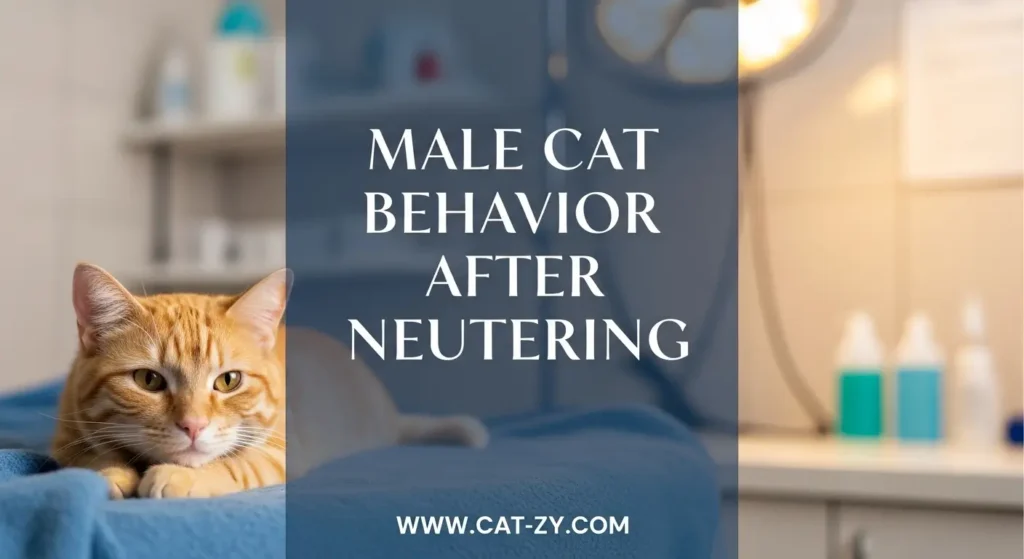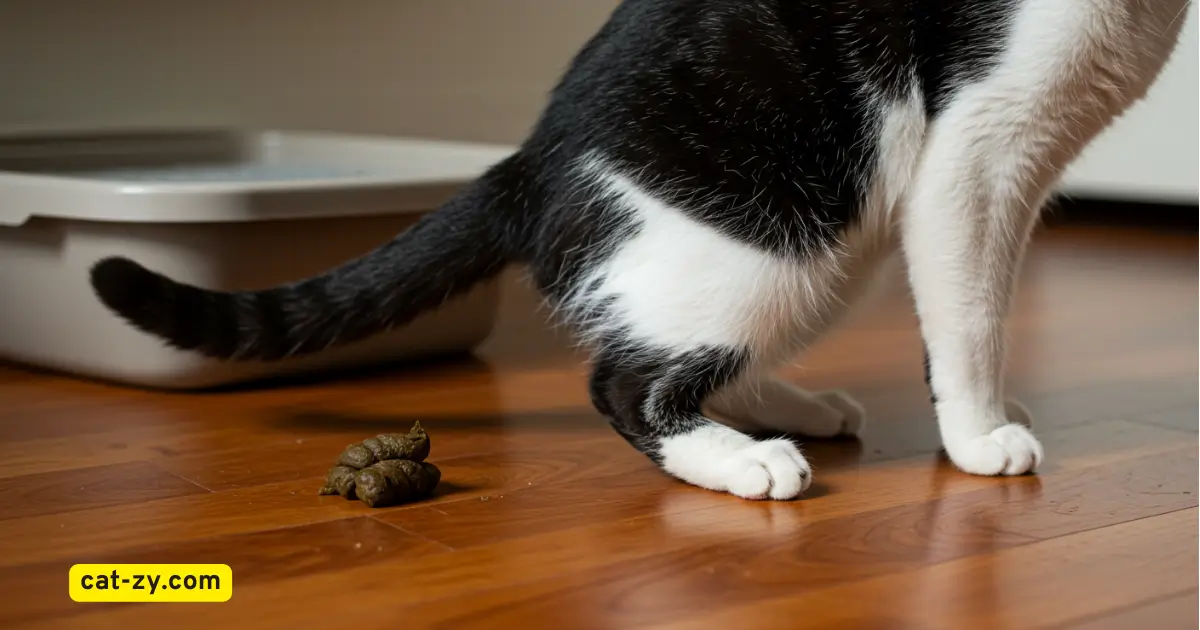Male Cat Behavior After Neutering: 5 Fascinating Changes You’ll Notice Fast
If you’re a cat owner thinking about neutering your male cat, you might wonder how it will change your pet’s behavior. The truth is, neutering can bring about big changes in your cat’s actions. Knowing these changes can help you take better care of your pet.
After the surgery, you might see many differences in male cat behavior after neutering. These can include less aggression and changes in how they mark their territory. These changes can be both interesting and welcome, especially if your male cat has bad behavior.
In this article, we’ll look at the 5 main changes you’ll see in your cat’s behavior after neutering. This will help you get ready for a smoother transition for both you and your pet.
Table of Contents
What Every Cat Owner Should Know About Neutering
Deciding to neuter your male cat can bring many good changes. Neutering is a surgery that makes your cat unable to have kittens. It’s a common choice for cat owners. Knowing what it means is key to making a good choice.
The Purpose and Benefits of Neutering
Neutering has many benefits for male cats. It can make them less aggressive and lower their risk of health problems. Understanding male cat behavior after neutering shows you’re making their life better and helping other cats too. It also stops them from marking territory and wandering off.
Common Misconceptions About Neutered Cats
Some people think neutering changes a cat’s personality or makes them less loving. But neutering mainly stops behaviors caused by testosterone, like aggression and wandering. It doesn’t make your cat love you less. Actually, neutered cats often display increased affection and demonstrate a more relaxed demeanor.
Understanding the Neutering Process for Male Cats
Thinking about neutering your male cat? It’s key to know what it involves. Neutering, or castration, is a surgery that removes the testicles. This makes your cat unable to reproduce.
What Happens During a Neutering Procedure
The surgery is done under general anesthesia. This keeps your cat safe and comfortable. Your vet will make a small cut in the scrotum, take out the testicles, and then stitch it up. It’s a quick and simple process.
The Physiological Impact on Your Cat
Neutering has a big physiological impact on your male cat. It changes their hormonal balance and how they recover physically.
Hormonal Changes
After neutering, your cat’s testosterone levels drop a lot. This leads to changes in their behavior and body.
Physical Recovery
Your cat will need time to get better after surgery. Adhering to your veterinarian’s post-surgical care guidelines proves essential for optimal recovery. This helps them recover smoothly and without problems.
Why Neutering Is Beneficial for Your Male Cat
Choosing to neuter your male cat is a positive step for his well-being. This surgery sterilizes your cat, bringing many benefits to its life quality.
Health Benefits of Neutering
The benefits of neutering provide crucial health advantages for your male feline companion. These include:
Reduced Risk of Testicular Cancer
Neutered cats don’t have testicles, so they can’t get testicular cancer. Unaltered male felines frequently experience this particular health concern.
Prevention of Prostate Issues
Neutering also lowers the risk of prostate problems. These can include prostatitis or prostate enlargement, causing discomfort and health issues in intact males.
Behavioral Advantages for Your Pet
Male cat behavior after neutering typically shows significant improvement. It reduces aggression and roaming. This makes your pet less likely to fight or get lost.
Community Benefits of Neutering
Neutering also benefits the community. It helps control stray cat populations. Such measures decrease stray animal populations while alleviating pressure on community rescue facilities.
In summary, neutering is a responsible choice for your cat and the community. Understanding neutering’s benefits helps you make a decision that improves your cat’s life and supports animal welfare in your area.
When to Neuter Your Male Cat: Timing Considerations
Knowing when to neuter your male cat is key for a smooth process. You need to think about your cat’s age, breed, and health.

Optimal Age for Neutering
Vets have debated the best age for neutering male cats. Traditionally, neutering was suggested at about 6 months. But new studies show the age can change based on the cat’s growth and breed.
Some vets now say neutering can start at 8 weeks or go up to 1 year. This depends on what’s best for each cat.
Special Considerations for Different Breeds
Each breed might need a different neutering time. For instance, bigger breeds might wait longer to be neutered. This lets them grow fully.
It’s crucial to learn about your cat’s breed’s needs. This helps you make a well-informed choice.
Discussing Timing with Your Veterinarian
The right time to neuter your cat is a decision for you and your vet. They can give advice tailored to your cat’s health, age, and breed. This ensures the best results for your cat.
Preparing Your Cat for the Neutering Procedure
Before your cat gets neutered, there are steps you can take to get them ready. Making sure your cat is prepared can greatly affect their comfort and safety. This is important for the surgery and their recovery.
Pre-Surgery Care Instructions
Your vet will give you specific instructions for your cat’s pre-surgery care. This might include not feeding or watering them for a while before the surgery. Strict adherence to these pre-operative guidelines prevents potential surgical complications.
Creating a Comfortable Recovery Environment
After the surgery, your cat needs a quiet, warm, and comfy place to rest. Set up a cozy spot in your home with a soft blanket or bed in a quiet room. This will help your cat recover better and lower the chance of complications.
What to Have on Hand for Post-Surgery Care
Having the right things ready can make caring for your cat after surgery easier. You’ll need any medicine your vet prescribed, a cone or e-collar to keep them from licking the surgery site, and comfy bedding. Watching your cat’s recovery and being ready to handle any issues is crucial for a good outcome.
The Immediate Post-Neutering Period: What to Expect
The post-neutering period is crucial for your cat’s healing. You need to watch for any challenges and know how to handle them.
First 24-48 Hours After Surgery
In the first 24-48 hours, your cat might feel some pain or swelling. Ensure your feline has access to a peaceful, comfortable recovery area. Keep an eye on your cat’s overall behavior and watch for any signs of complications.
Managing Pain and Discomfort
It’s important to manage your cat’s pain well. Your vet will give you pain meds to help. Administer the medication as directed, and watch for any side effects.
Monitoring for Complications
Even though complications are rare, it’s key to watch for any unusual signs or symptoms.
Signs of Normal Healing
Normal healing signs include a bit of swelling or redness at the incision site. This should get better over time. Your cat might eat less or feel more tired, but this should get better in a few days.
When to Call Your Veterinarian
If you see any of these signs, call your vet right away: a lot of bleeding, big swelling, discharge or redness at the incision, vomiting, diarrhea, or lasting tiredness. Your veterinarian is your best resource for any concerns during the post-neutering period.
Male Cat Behavior After Neutering: The Complete Guide
Neutering changes a male cat’s behavior in many ways. Cat owners need to know these changes to care for their pets well. Understanding these changes helps create a loving home for your cat.

Timeline of Behavioral Changes
Male cat behavior after neutering changes happen in predictable stages. These stages include immediate, short-term, and long-term adjustments.
Immediate Changes (1-7 Days)
In the first week, your cat might be tired and less active. They need a quiet, comfy place to rest and recover.
Short-Term Changes (1-4 Weeks)
As your cat gets better, they’ll likely be less aggressive and mark less. This is because testosterone levels go down.
Long-Term Changes (1-3 Months)
In the months that follow, testosterone’s drop will cause more noticeable changes. Your cat will roam less and be less aggressive toward other animals.
Hormonal Shifts and Their Effects
The main hormonal change after neutering is a drop in testosterone levels. This decrease leads to the behavioral changes seen in neutered male cats.
When to Consult Your Veterinarian About Behavior
Should your feline exhibit concerning behavioral changes following the procedure, consult your veterinary professional immediately. They can help manage tough behaviors and keep your cat happy and healthy.
Change #1: Reduction in Territorial Marking
Male cat behavior after neutering commonly includes a big drop in territorial marking. This is a big plus for those who’ve had trouble with their cat’s spraying. It’s a common problem with intact male cats.
Why Male Cats Mark Territory
Male cats spray urine to mark their territory. This shows they’re trying to be the boss and let other cats know they’re around. It’s all because of testosterone, the hormone that makes them male.
How Quickly Marking Behavior Decreases
The drop in marking isn’t instant. It usually takes a few weeks to a couple of months after neutering. How fast it happens depends on the cat and how much testosterone they had before surgery.
Dealing with Persistent Marking Issues
Even with neutering, some cats might still mark. To handle this, you need a plan that covers a few areas.
Environmental Modifications
Changing your cat’s environment can help. Provide additional bathroom facilities, minimize environmental stressors, and install extra vertical climbing opportunities. This makes them feel like they own the place.
Behavioral Training Techniques
Using positive training can also work. Reward them for using the litter box correctly. Remember, it takes time and patience to change their ways.
Change #2: Decreased Aggression and Fighting
Neutering a male cat often leads to less aggressive behavior. This aspect of male cat behavior after neutering occurs because testosterone levels drop significantly.
The Link Between Testosterone and Aggression
Testosterone affects aggression in cats. Male cat behavior after neutering reflects decreased testosterone production following the surgical procedure. This means your cat is less likely to fight with others. Knowing this helps understand why neutering can reduce fighting in cats.
Timeline for Aggression Reduction
When you see a drop in aggression varies. But, many owners notice a change in a few weeks to months after neutering. It’s important to be patient and watch for changes.
Helping Your Cat Adjust to a More Peaceful Temperament
To help your cat adjust, create a stress-free home. Use positive reinforcement to support their new calm nature. This can greatly improve the decreased aggression after neutering.
Creating a Stress-Free Environment
A calm living space greatly affects your cat’s behavior. Provide your feline with tranquil spaces designed for comfortable recuperation and relaxation. A peaceful environment helps your cat thrive.
Positive Reinforcement Strategies
Give treats and praise when your cat is calm. This encourages them to stay peaceful. It helps solidify the benefits of neutering.
Change #3: Reduced Roaming and Escape Attempts
Neutering changes how male cats behave, especially in reducing roaming and escape attempts. Intact male cats roam to find mates, which can be dangerous and lead to getting lost.
Why Intact Males Roam
Intact male cats roam because of their instinct to mate and show dominance. This urge is fueled by testosterone, pushing them to search for females in heat.
How Neutering Affects Your Cat’s Desire to Wander
Neutering lowers testosterone levels in your cat, reducing their urge to roam. This decrease in roaming behavior lowers the risk of fights, injuries, and diseases.
Transitioning an Outdoor Cat After Neutering
After neutering, it’s crucial to move your outdoor cat to a safer place. You can do this by creating a secure outdoor enclosure or making their indoor space more interesting.
Safe Outdoor Alternatives
Think about building a catio or a fenced outdoor area for your cat. This lets them enjoy the outdoors safely, providing the stimulation they need without risks.
Enrichment for Indoor Cats
For indoor cats, offer environmental enrichment like cat trees, interactive toys, and scratching posts. These keep them active and engaged.
Understanding and meeting your cat’s needs after neutering helps them adjust better. This ensures a happier, healthier cat for you.
Change #4: Changes in Social Behavior and Interaction
Your male cat’s social behavior will likely change after neutering. These changes can affect how they interact with family and other animals. They can also make your bond with your pet stronger.
Interactions with Other Pets
Neutering can make male cats less aggressive and competitive. This leads to better living conditions with other pets at home. Your cat may become more relaxed and less likely to fight, making your home more peaceful.
Changes in Human Bonding Behavior
After neutering, many male cats show more love to their human caregivers. They might become more clingy or want more attention. This is because their testosterone levels go down, making them want to be around people more.
Creating Positive Social Experiences Post-Neutering
To create a positive environment, engage your cat in activities that build social bonds. This includes playtime and building trust.
Playtime Strategies
Play with your cat using toys or laser pointers to stimulate their hunting instincts. This exercise strengthens your bond and keeps them active.
Building Trust and Confidence
Establish a stable routine to build trust. Dedicate meaningful interaction periods with your feline while maintaining patience during their behavioral transition. Reward-based training using food incentives and verbal encouragement promotes desirable conduct patterns.
Change #5: Potential Weight Gain and Appetite Changes
After neutering, male cats often eat more and may gain weight. This is due to changes in their metabolism.
Metabolic Changes After Neutering
Neutering changes your cat’s hormones, especially lowering testosterone. This can slow down their metabolism. If their diet doesn’t change, they might gain weight.
Preventing Obesity in Neutered Cats
To stop obesity, watch your cat’s diet and exercise. Dietary adjustments are essential. You might need to switch to a lower-calorie food or feed less.
Dietary Adjustments
Switching to a lower-calorie food can help manage weight. Consult your veterinary professional to determine appropriate nutritional plans for neutered cats.
Portion Control Techniques
Measuring food portions can prevent overeating. Use a measuring cup to keep track of what your cat eats.
Exercise Routines for Neutered Cats
More playtime and activity can help balance metabolic changes. Play with toys or laser pointers to keep them active.

Conclusion: Supporting Your Cat Through the Transition
Male cat behavior after neutering involves significant positive changes. neutering your male cat can change their behavior a lot. They might mark less and be less aggressive. It’s important to help your cat adjust smoothly.
After neutering, you need to watch your cat’s behavior and manage any pain. Knowing what changes to expect helps you care for your cat better.
Every cat reacts differently after neutering. But with time and the right help, they can adjust well. By following the advice in this article, you can make sure your cat stays healthy and happy.
FAQ
How long does it take for a male cat’s behavior to change after neutering?
Changes in behavior after neutering can happen quickly or take a bit longer. You might see some changes in the first week. But, bigger changes could take a few weeks or even months.
Will neutering stop my male cat from spraying or marking territory?
Neutering can really cut down on marking behavior in male cats. But, it’s not a 100% fix. Some cats might still mark their territory. You can try changing their environment and teaching them new behaviors to stop this.
Can neutering reduce aggression in male cats?
Yes, neutering can make male cats less aggressive by lowering their testosterone. You’ll start to see these changes in a few weeks to a few months.
How can I help my cat adjust to a more peaceful temperament after neutering?
To help your cat relax, make their environment calm and use positive rewards. Playing with them and building trust can also help them feel more at peace.
Will my male cat gain weight after neutering?
Neutered cats might gain weight because of changes in their metabolism. To avoid obesity, feed them the right amount and keep them active.
How can I prevent my neutered cat from roaming or attempting to escape?
Neutering helps, but you still need to keep them safe. You can keep them indoors or provide them with fun activities to keep them happy and busy.
Can neutering affect my cat’s social behavior and interaction with other pets or humans?
Yes, neutering can change how your cat acts around others. To improve their social skills, play with them and help them feel more confident.
What are the health benefits of neutering my male cat?
Neutering is good for your cat’s health. It lowers the risk of testicular cancer and prostate problems. It also helps prevent bad behaviors and injuries from roaming.
How do I care for my cat after the neutering procedure?
After neutering, follow the care instructions given before surgery. Make sure they have a comfy place to rest and have everything they need for recovery. Watch them closely for any signs of trouble.









One Comment
Comments are closed.